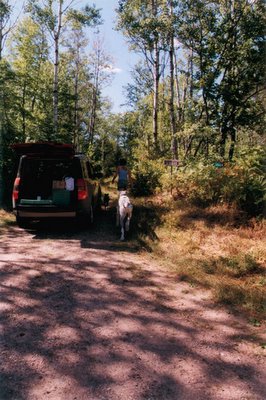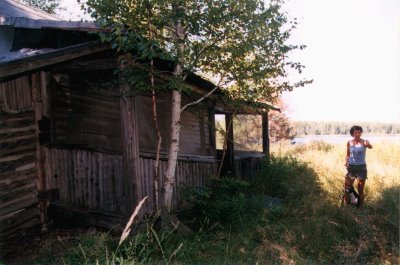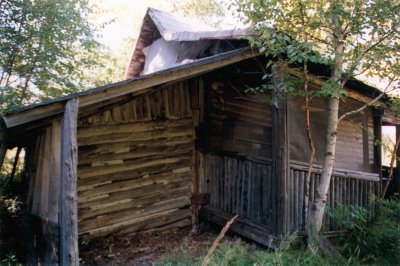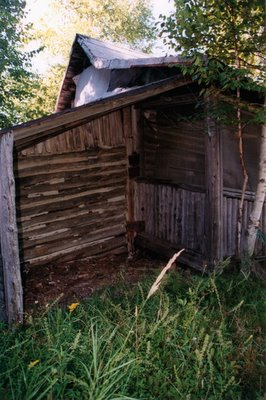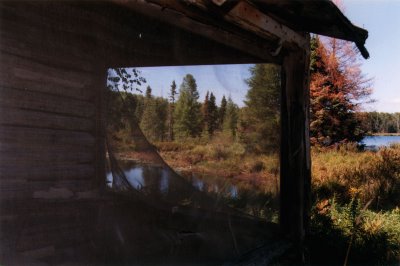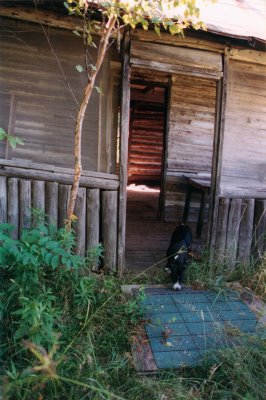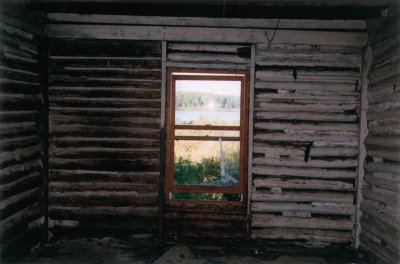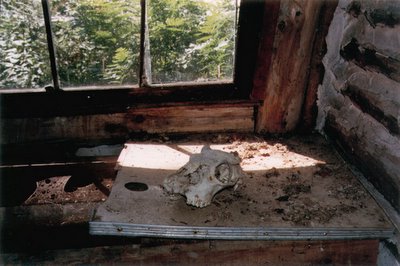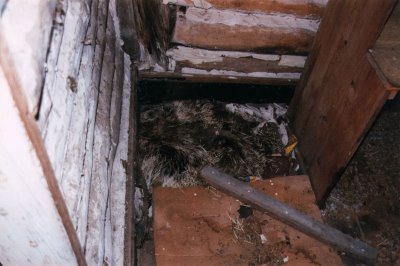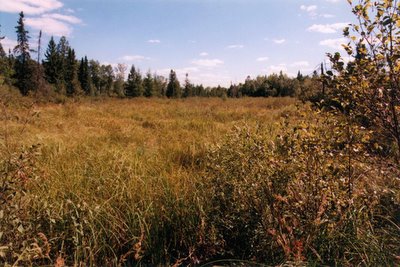One thing I always liked about Wisconsin was the weather. I liked the wide range of different types of weather. In the summer, there were some mild breezy days, and some windless sunny sweltering days. Sometimes in the middle of summer, the nights would be hot, but in early or late summer, the nights might be cool, even if the days were hot. In the winter, or even late autumn, the temperature might fall below zero fahrenheit. There was often snow in the cold season, up to several feet of it.
In addition to the wide range of normal weather, there was always the threat of more extreme weather. Summer thunderstorms could be violent, with rain pouring down and fierce wind gusts that would break off tree limbs or even knock down whole trees. Winter blizzards could dump huge amounts of snow in a short amount of time, with wind piling up large snow drifts. There were also occasional tornados in the state, adding to the excitement of a rapidly darkening summer sky.
My uncle told me about being up at the cabin in Phillips during an unusually strong rain storm. He said the cabin was shaking and he thought it might fall down around him. The old windows (before the vandals broke them, and they were replaced) had cracks in them, and the rain was coming down so fast, and the wind blowing so hard, that a little jet of water was shooting through one of the cracks in the window. Lots of trees were blown down during that storm. I think he had to cut through about twenty trees that had fallen across the dirt road to get to the county road.
My dad told me about going up to the cabin one winter. I had been there in late November quite a few times, and the cold and snow was more extreme than what I was used to in the middle of winter, so it was hard for me to imagine that it could be much worse. But from his description, it was a lot worse. There was a blizzard while he was there, and the temperature dropped precipitously. He was spending most of his time just trying to stay warm, constantly feeding the wood stoves. One evening, he loaded up the wood stove to get a roaring fire going to try to warm up the place. He took a drink from a mug of water, and put it on the wood stove to keep it warm, then got into his sleeping bag on the bunk next to the wood stove and fell asleep. After a few hours of sleep, he woke up shivering. The fire was out, and the mug of water he had left on the wood stove was frozen solid. I think it was then that he decided to leave the cabin as soon as he could get his car to the plowed road.
Grandad told me that he was walking through the woods after a severe storm, and there were a lot of trees down. Constantly having to climb over, or squeeze under the fallen trees made progress much slower than usual. He got to one area where almost every tree for twenty or thirty yards was blown down. The strange thing about it was that all the trees were blown down in a direction facing out from the center of the area, so it looked like there had been an explosion of some kind. It was as if a huge column of air had come straight down to the ground, spreading out in every direction, knocking trees down as it went.
Grandad also told me about the Armistice Day storm of 1940. He said it started out as an exceptionally mild fall day, about 60 degrees Fahrenheit, with occasional light rain. It seemed like a perfect day for hunting, so all over Wisconsin and Minnesota, duck hunters went out to their favorite spots. Since it was so warm, many hunters went out in short sleeves and took only light jackets, if anything. Hunters went to ponds in the woods, or rowed boats out to their blinds or islands in lakes and rivers. What they didn't know was that there was a fast moving cold front heading their way.
Towards midday, clouds came rolling in and the temperature started to drop. At this point, some hunters decided to call it a day and head home. Ironically, as the wind increased and the temperature continued to drop, all the ducks started flying down to lakes and ponds to try to get away from the worsening weather. This caused many hunters who might have gone home to stay out because the hunting was so good. By the afternoon, many hunters had shot their limit, but by this time, snow was falling and the temperature had fallen to nearly zero fahrenheit and the wind was gusting at up to fifty miles per hour.
By the time they realized how bad the weather was getting, it was too late for a lot of hunters. Some foundered in boats overloaded with freshly shot ducks in the waves whipped up by the wind on even relatively small lakes. Some got lost trying to find their cars in the white out conditions and froze to death. Some hunters were found days later, frozen solid in their shirtsleeves. Over 150 people died in that freak storm.
I can't remember whether grandad said he was out hunting that day, or if it was someone he knew, but whoever it was, was in a duck blind at the edge of a large lake. As the wind picked up, blowing right into their faces, the water around the duck blind started mysteriously rising, eventually pouring into the duck blind. That caused the hunters in the duck blind to get wet, so they decided to call it a day and go home, fortunately for them. Their route home took them around the other side of the lake, and as they drove by the opposite lake shore, they saw something that explained why the water had risen into their duck blind. The water on that side of the lake had receded, leaving about twenty yards of lake bottom completely exposed. The wind was so strong and steady that it was blowing the lake water to one side of the lake.
Later, I read somewhere that this weather system had started in the west, where it caused particularly strong winds in the Tacoma Narrows in Washington. The reader may be familiar with a particular event that occurred on November 7, 1940, having to do with a bridge over the Tacoma Narrows.
So one night while I was at the cabin alone in the summer, I heard the wind blowing. I didn't remember it being windy earlier, so I went outside and the wind had definitely picked up. The moon had disappeared behind thick clouds, leaves were rustling and trees were starting to sway. I noticed some flashes of lightning in the distance, and it smelled like it was going to rain. It seemed eerie standing outside in the darkness with the wind rushing past my face and I suddenly felt a little bit vulnerable. I was thinking about tornadoes, falling trees and fast moving cold fronts.
I had left a few recently washed towels and t-shirts out to dry, so I took them inside. The wind started getting stronger, and the cabin started creaking and I could feel little drafts blowing through the various cracks and holes in the walls. I started hearing distant thunder and seeing more frequent flashes of light in the sky. Then the wind actually started howling and the cabin would occasionally shudder when a gust hit it. I was worried that the old place might blow down with me in it, but I consoled myself that the place was indeed old, and must have withstood lots of storms like this one.
There was a bright flash and almost instantaneously after a loud crack of thunder, and rain started pouring down. The rain was beating against the windows, and when I looked out front, water was streaming off the roof. Seeing a stream of water that didn't have to be carried from the boat spurred me into action. I started collecting all of the tubs, pots and pans I could find and took them outside to collect the rainwater flowing off the roof. I quickly got soaked as I placed the vessels under the eaves. The wind had died down a bit, but the pouring rain and crashing thunder were deafening. I got a strange almost euphoric feeling as I was rushing around in the din trying to find every container I could to fill with this wonderful clean water that didn't have to be fetched from anywhere. I even got some old plastic jugs. There was plenty of water to rinse them out and fill them up from other pots sitting under the eaves. I even filled up a plastic jug by holding it under the faucet-like stream coming from the end of the wooden gutter over the door.
All the containers were overflowing with rainwater, and the rain was still coming down. Since I was already soaked anyway, I took off my clothes and took what seemed like a real shower out in front of the cabin. The rain was actually pretty cold, so it wasn't exactly luxurious, but at least I didn't have to pour the water on myself.
It was still raining as I dried myself off and put on dry clothes, and there seemed to be even more lightning. I stood in the doorway on the porch looking out into what was alternately bright light and complete darkness. There was lightning almost every other second, and it seemed almost like a disco with a strobe light. The trees were dancing violently to the music of the storm. One second there would be a flash and a big tree would be leaning over to the left, the next moment, another flash, and the same tree would be leaning way over to the right.
By this time I had more confidence in the cabin, and its creaks and shudders were more reassuring mutterings of a sturdy old friend than startling cries of impending danger. I felt a great sense of well being watching this spectacle of nature gradually die down from under a relatively leak free roof, having secured a good supply of water with minimum of work, and gotten clean in the bargain.
